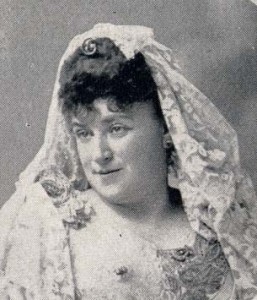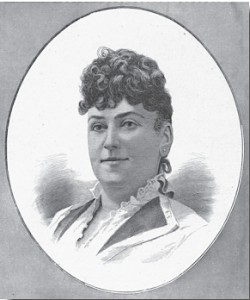Julie Eichberg Rosewald
Values Codes I – E – L – P
Julie Eichberg was born in Stuttgart, Germany, in 1847.
Her father, Moritz Eichberg, was a cantor in the city and, along with his wife Eleanor, raised a musically talented family.
Julie’s vocal abilities were identified at a young age, and she was enrolled at the Stuttgart Conservatorium.
Along the way
Julie Eichberg came to America when she was seventeen, joining her sister Pauline, a piano teacher, in Baltimore, Maryland.
In 1866, Julie Eichberg was wed to Jacob H. Rosewald, a renowned violinist and conductor.
The couple frequently performed in Baltimore’s Jewish community.
[Click Here for our Jacob Rosewald exhibit.]Julie Eichberg Rosewald was active in opera for the next twenty years, including a stint with the Kellogg English Opera Company, a European tour, and a prima donna role in the Emma Abbot Company, under the direction of her husband.
San Francisco
In 1884, the Rosewalds moved from Baltimore to the comparatively mild climate of San Francisco, primarily because of Jacob’s failing health.
Julie planned to retire from the stage and teach singers involved in the city’s thriving opera and concert scene.
But something unprecedented occurred in August of that year.
Cantor Max Wolff of Congregation Emanu-El passed away, and the congregation needed a quick study to conduct the fast-approaching High Holiday services.
The progressive temple hired Julie Eichberg Rosewald to serve as its cantor, marking the first time on record that a woman led synagogue services in the United States.
“The services of the various synagogues on Rosh Hashanah were thoroughly in accord with the solemnity of the occasion….The singing was a feature of the service, Mrs. Rosewald at the Temple Emanu-El filling her arduous position with great credit.”
— The Jewish Progress, 1884
Though she was not officially trained as a cantor (cantorial investiture was opened to women in 1975), Julie Rosewald served Emanu-El until 1893.
In that capacity, she directed choir rehearsals, collaborated with the organist, made musical selections, and sang solo parts during services.
According to Judith S. Pinnolis, who discovered this previously forgotten chapter of American Jewish and musical history, Julie Rosewald earned the position due to a combination of factors, including the Hebrew and Judaic instruction she received from her cantor father, her classical music background (highly valued in Reform temples of the period), her Jewish musical experience in Baltimore, Emanu-El’s forward-thinking leadership, a young congregation that tolerated informalities, and the rise of the “New Woman” in late nineteenth-century America—a proto-feminist awareness of women’s independence and professional aspirations.
Congregation Emanu-El hired Cantor Edward Stark in 1893.
Julie Rosewald took a teaching position at Mills College Conservatory of Music from 1894 to 1897.
Julie Rosewald earned notoriety as a premier vocal coach.
She published an instructional book, How Shall I Practice? Practical Suggestions to Students of Music in 1891.
Family
In 1866, Julie was wed to Jacob H. Rosewald.
Julie Eichberg Rosewald died in 1906 while on holiday in her native Germany.
Source
- Judith Pinnolis, “Cantor Soprano’ Julie Rosewald: The Musical Career of a Jewish American ‘New Woman,”‘ The American Jewish Archives Journal 62/2.
Jonathan Friedmann is curator of this Julie Eichberg Rosewald exhibit.


